The Israeli military has issued warnings to medical staff and aid groups to prepare for the evacuation of Gaza City, home to one million residents, as it gears up for an offensive aimed at occupying the territory. Amid increasing criticism and fear of humanitarian crises, the situation on the ground remains dire with reports of escalating air strikes and growing civilian casualties.
Israel Prepares for Gaza City Evacuation Amid Intensifying Conflict

Israel Prepares for Gaza City Evacuation Amid Intensifying Conflict
Israeli military plans to evacuate Gaza City’s residents before launching a major offensive, raising humanitarian concerns from health officials and international organizations.
Israel's military has alerted medical officials and international aid organizations to make preparations for the evacuation of Gaza City's one million residents ahead of a planned offensive. The military, which is set to occupy Gaza City, indicated that modifications are being made to hospitals in southern Gaza to accommodate incoming patients. However, the health ministry, led by Hamas, firmly rejected any actions that might jeopardize the already fragile health system in Gaza.
Despite Israeli military reassurances about treatment provisions in southern Gaza, there is significant skepticism among health authorities and aid groups regarding the humanitarian implications of such evacuations. The UN and various NGOs have committed to remaining in Gaza City to assist those unable or unwilling to be displaced. Reports indicate a severe bombardment of eastern Gaza City, which follows Israel's announcement of its intention to expand its military operations in Gaza after ceasefire negotiations with Hamas have broken down.
Israeli Prime Minister Netanyahu convened security officials to finalize plans for the military's incursion into Gaza, an action that faces substantial pushback both domestically and internationally. The military has initiated "initial warning calls" to inform medical and aid officials that hospitals in the southern part of Gaza will be reinforced with medical supplies and infrastructure; however, there are fears that this will lead to a collapse of the health system, which is already operating at overcapacity due to previous conflicts.
Motasem Dalloul, a journalist reporting from Gaza City, observed rapid escalations in military activity, including numerous Israeli air strikes that continue to lead to loss of life and the destruction of homes. While Israeli forces call for civilians to evacuate to "safe zones" in the south, many are reluctant to leave their homes, apprehensive that safety cannot be guaranteed anywhere across the territory.
Several hundred individuals in Gaza participated in protests against the ongoing conflict, expressing exhaustion from constant violence and pleading for a resolution to hostilities. Their sentiments echoed a broader appeal for an immediate ceasefire to prevent further casualties among civilians.
On the Israeli side, families of hostages held by Hamas are increasingly vocal about the urgency of reaching a ceasefire agreement, emphasizing the need for secure and prompt negotiations for the release of their loved ones. Mediators from Egypt and Qatar continue to work towards a potential deal, yet Israel demands a more comprehensive agreement that includes the release of all hostages.
UN Secretary-General António Guterres has reiterated the critical need for an immediate ceasefire to avoid catastrophic humanitarian consequences in Gaza City, accentuating the high stakes of the military's imminent offensive. As hostilities intensify, the international community watches closely, fearful of the drastic human toll the conflict may escalate to if immediate action is not taken. Since the conflict erupted, Gaza's health ministry has reported over 62,000 deaths, highlighting the urgent need for sustained humanitarian support amidst growing violence.



















